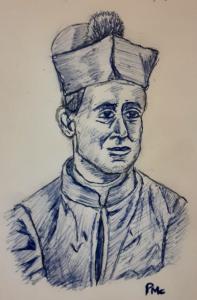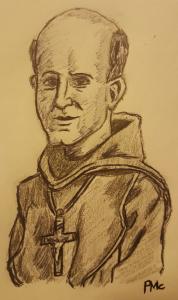![Ives_Levi_Silliman_Archive_org_livesofbishopsof00hayw_0097[1]](https://wp-media.patheos.com/blogs/sites/224/2013/11/Ives_Levi_Silliman_Archive_org_livesofbishopsof00hayw_00971-243x300.jpg) THE LECTURE SEASON. Catholic Library Association—Lecture by Dr. Silliman Ives—“Catholic Rome the Patroness of Knowledge” (The Brooklyn Eagle, November 2, 1860, p. 2)
THE LECTURE SEASON. Catholic Library Association—Lecture by Dr. Silliman Ives—“Catholic Rome the Patroness of Knowledge” (The Brooklyn Eagle, November 2, 1860, p. 2)
A lecture was delivered last evening at the Brooklyn Institute under the patronage of the Catholic Library Association. The lecturer of the evening was the Dr. Silliman Ives, who was formerly Episcopal Bishop of North Carolina and whose resignation and adoption of the doctrines of the Church of Rome has excited considerable discussion in the religious world. The audience was not numerous. Mr. John O’Mahoney, the President of the Association, introduced the lecturer who is a tall, sharp-featured intellectual looking gentleman pretty far advanced in life. The title of the lecture was announced to be “Catholic Rome the Patroness of Knowledge” and of the manner the subject was treated the following report will probably give a fair idea. The lecturer said:
Facts are always better than assertions; when Socrates was accused, he brought forward his works in his defence. When Rome is traduced we bring forth her works in her behalf, and adduce in her defence the facts of her history. The difficulty here is, however, not in bringing forward the facts, but in getting them before the people and inducing them to calmly give them their attention. People who have been brought up from childhood to hear but one side are not to be expected, without great reluctance, to take up new argument and give it the fair judgment which it demands. The idea appears little less then sacrilegious; for it is an interference with the faith of our fathers, an intrusion as it were into their sepulchre, even in a measure sitting in judgment on their future state. He could well remember the effect it has on himself—how it changed, yea how it shook his belief in almost everything—when he found that the best part of his mental life, its settled principles, its inspiring motives of action were nothing more than illusions of an empty dream. Well did he remember what a long struggle it cost him and before he could freely and calmly consider the facts and history of the Catholic Church, and deeply did he sympathize with those whom reason, honor and justice call to the same painful task; but painful as it may be, it is a duty that cannot be disregarded. He believed there is a sense of justice in the American mind that would secure for the Catholic people a hearing. The Catholic with hand on heart protests before his countrymen that he is innocent of that with which he is charged, he would not believe that the facts they bring before their countrymen will not be heard; he would not believe that intolerance was yet sufficient or bigotry powerful enough to condemn them before the facts they bring forward were heard. In the belief that a fair hearing would be given the facts he was about to present were given. In almost every speech that is delivered, in almost every periodical which is published it is charged on Christian Rome—or on the Catholic Church which Christian Rome represents—that she is hostile to all progress and improvement; that it is her settled policy to keep her people in degradation, for that on this the preservation and perpetuity of her power depends. In answering this charge it was not his purpose to show that Catholic Rome has been in favor of the indiscriminate diffusion of knowledge, for we maintain with perfect consciousness of its truth that it is the duty of whoever is invested with the office of supreme pastor to guard his flock from impure literature and from science that is falsely so called. And the Holy Father manifests hostility to dangerous error or to the too early diffusion of truths that would not tend to keep men in obedience to the will of God. Again he desired it to be observed that he was not defending the conduct of ecclesiastics who might have opposed advancement—though his reading during a long life has not furnished him with many examples—but what the church in its compact character as a church had done. He did not maintain that the Church had been uniformly successful in disseminating learning, or that in all times in her history there has been equal intellectual advancement, but the Catholic Church has always been in advance of the age in the dissemination and encouragement of sound literature and real science. The lecturer went on to show that the motives of the Catholic Church could be best learned from her early history, as in that period she had most control over science and literature, and most power to advance or retard their progress. He went back to the time of Pope Gregory the first, called the Great, who lived in the very heart of the so called dark ages, and who is charged with a particular zeal for the advancement of Catholic truth and the enlargement of Catholic power. It is charged against that he forbade the reading of the heathen poets in the schools; but it was because of their obscenity, and because he thought it would corrupt the minds of the youth whom the Church was leading from heathenism to Christianity. The question here was not whether learning was good; that was not disputed; but the question was whether the means of acquiring it were good. It was not a political question; the pontiff gave his counsels as a father would to his children. The acts of his life was a better testimony than a few and uncertain casual remarks in his writings. All testimony on the point is that Gregory was himself one of the most learned men of his age; he raised the standard of learning at Rome; he built palaces for the education of the missionaries he sent to other lands, and obliged them to carry libraries with them for the dissemination of the knowledge they had acquired. St. Augustine and his brethren brought them into Britain, and Protestants can’t deny that to the manuscripts they brought, we are indebted for the learning that succeeded them. When Christianity emerged from the Catacombs into the world, she became at once the disseminator and teacher of knowledge. When the first missionary was sent to Ireland in the seventh century, under St. Patrick, it had not been established long when the Catholic Church sprung up, and what is more to our present purpose, Catholic Colleges spring up alongside them, and their fame so extended, that professors in those Irish colleges were preferred as teachers in the colleges of Germany, France and Italy. During the same period when the apostate Julian, in his enmity closed the public schools of Rome, it was a standing cause of complaint with the Catholic Church. Catholic schools existed in Rome as early as the time of St. Augustine, for it is known that he left his native city to prosecute his education there.
In the year of 440 in the pontificate of St. Leo numbers of public schools existed in the holy city—and throughout Italy; in Spain schools were established in the house of every parish priest, and the reason for it was given that this salutary practice prevailed in Italy. He mentioned the Venerable Bede in England and hardly less venerated Alfred, and alluded to the colleges then established, and gave the authority of the Protestant historian Hallam for the fact that in those early times were established those universities from which sprung the learning of which England now boasts. When in the 9th century in schools of Europe were overturned the prelates of France and Germany assembled at Tours and besought the rulers to restore to their people the schools that had been destroyed, all showing that the Church believes her success is best served by enlightenment and not by ignorance. In those times it is well known that the secular powers were hostile to the diffusion of knowledge and the nobles were engaged in noble sports and pastimes; if ignorance favored the policy of the Church she had nothing to do but let things take their natural course, instead of exerting every effort to promote knowledge among her children. She believes that under God the advancement of knowledge is one of the best means of securing the perpetuity. He was aware that it had been urged that the schools were established for the use of the ecclesiastics and that all studies were carried on in the Latin language. He quoted from Sisamonde, who shows that there was nothing singular in this for Latin was the language of religion, it was the language of learning and had been so generally disseminated that the songs of the soldiers were sung in it, through France, Germany and Italy, and the Venerable Bede states that learning was so generally diffused that our Saxon forefathers were as familiar with the Greek and Latin as with their native tongue, showing that Latin was not alone the language of the schools but the language of the people. He next defended the early literature of the Church from the charge that it was not polluted by romance and fable. The charge he believed emanated not from any objection to the admixture of the romantic but because it brings before the minds of this material age that which is eternal and supernatural and from which in those times men would gladly turn away. The legends of the saints he said taught lessons of self denial, self abnegation, noble devotion, glorious achievement. To the charge that a knowledge of the holy scripture was held from the people he answered that it could not before the invention of printing be as generally as disseminated as now, but the Bible was unceasingly copied in manuscript and in every place of learning a copy was placed accessible to all. When social disturbance brought mental night over Europe, the Monks multiplied the scriptures, to be disseminated again in quieter times. He alluded to the labor and the learning of St. Benedict and St. Dominick whose followers spread over Europe reclaiming her deserted fields and rekindling the desire for knowledge. They labored to rescue from the past its learning, its literature and science, on which the advancement of the present is based. They published hundreds of volumes of the ancient classics, they established colleges at Paris, Oxford, and Cologne, and Protestant Gibbon has declared that in those times in a single monastery more literary and scientific works were produced than at both of the English universities. A century later when more formidable combatants were contending for the prize of knowledge the list was entered by the noble, the magnanimous Society of Jesus. (Applause.) What weapons did they use in their defence? Did they call ignorance to their aid? Did they claim to be heard because they spoke by inspiration? Look at the list of learned men in their order, the colleges they established, the monuments of learning they left behind them, their system of instruction which everywhere prevailed—winning largesses from Kings and smiling benedictions from Popes. The lecturer rapidly glanced at the age of Leo X, and then came down to later times, quoting from Protestant writers in support of his own views, that nowhere was useful knowledge more generally diffused than in Catholic countries. He referred to the work of a Presbyterian clergyman named Lane, and recommended the editors of New York papers read his volume before writing their daily abuse of Catholic Rome, which abuse, Mr. Lane says must arise from either malice or stupidity. The lecturer named the great men that Rome herself had produced, summed up the imperial monuments of art and genius in the holy city, and adduced the library of the Vatican, with its thousands of M.S. and its 1,000,000 volumes, laboriously collected through so many ages, as proof that learning had always in Catholic Rome a conservator and patron. In Rome to-day there are no less than ten universities for the instruction of the native Italians and 10 for the education of foreigners; in all there are twenty-one, while in New York City where there is five times the population, there are three little colleges and two universities so called. He said that in the public schools of the Imperial City there were now 28,890 students. Are all these he asked the monument of Papal zeal on behalf of ignorance? He referred again to the fact that the pontiff had opposed the indiscriminate diffusion of knowledge for the Church; he believes all knowledge should be subservient to the truth of God. He pointed out the pernicious doctrine which had been disseminated among the Albighenses who, he said, were taught to reject marriage, despise chastity and believe in a community of goods and other socialistic theories. And to the followers of Wickliffe, among whom were disseminated doctrines equally dangerous. It was the duty of the head of the Church to forbid such knowledge as this and he did, but the Church he had shown had ever been the friend and promoter of sound learning and true science, and it was the duty of every son of the Church to advance both, for we believe that in their advancement is advanced the true and most sacred interests of the Church. The lecturer continued at some further length, and concluded amid the manifestations of approbation from the audience.
NOTE: Levi Silliman Ives (1797-1867) was born in New England, became an Episcopal priest in New York, and at age 34 was named Episcopal Bishop of North Carolina, a highly prestigious position in the Antebellum South. In 1852, he left the ministry when he converted to Roman Catholicism and moved to New York City’s Manhattanville section as a layperson. There he taught rhetoric (speech) at local colleges, including St. John’s College (now Fordham University). He also worked in charitable endeavors, especially with orphans until his death on October 14, 1867. Throughout this period, he was a frequent lecturer to popular audiences like the speech cited above.











